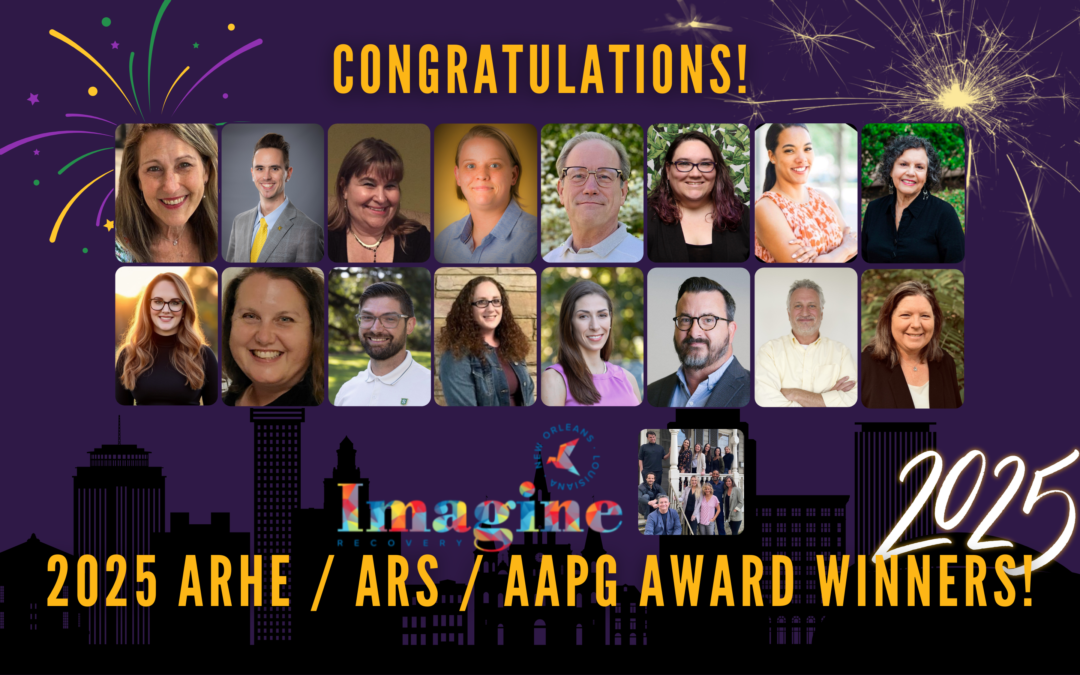ARHE Award Winners
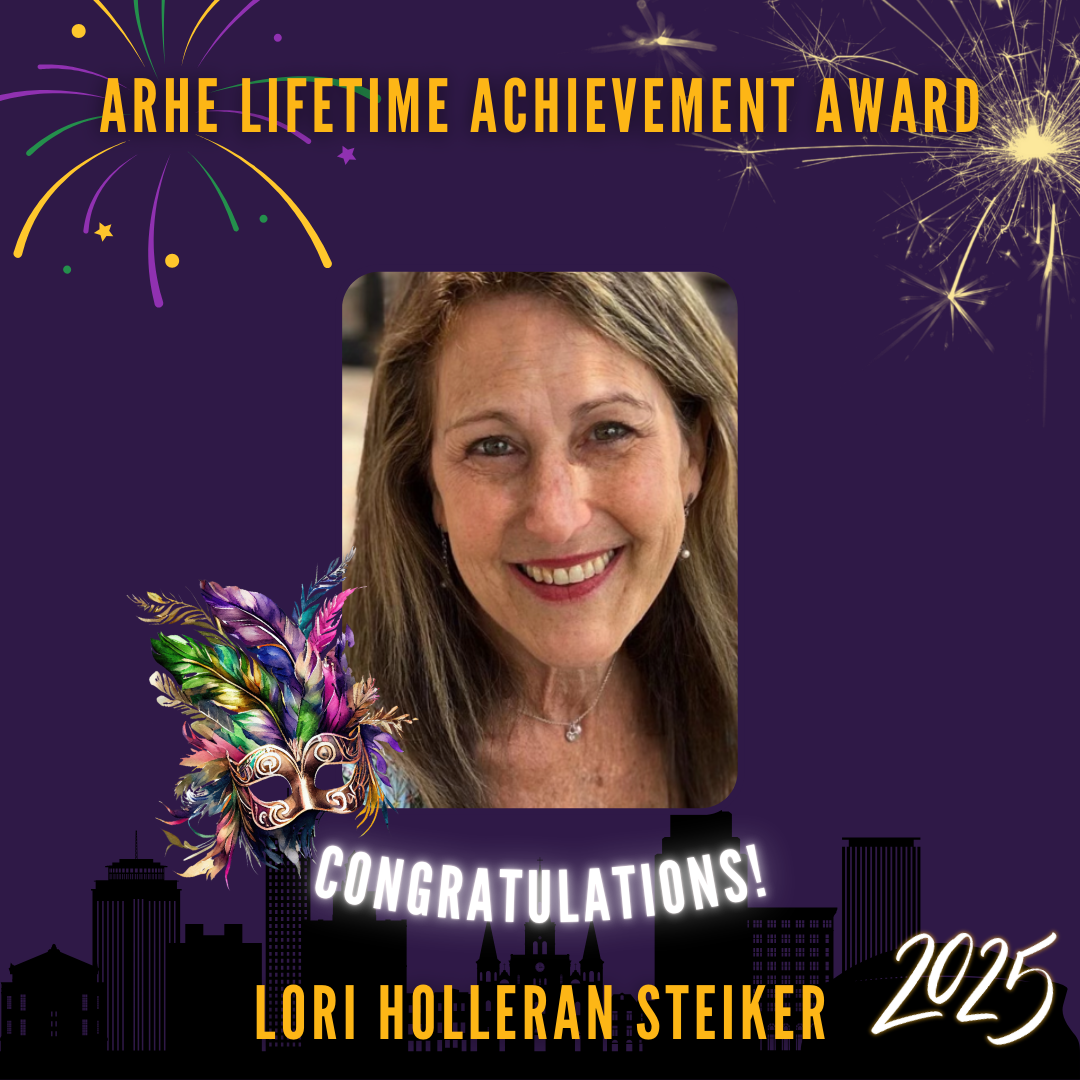
Lori Holleran Steiker
ARHE Lifetime Achievement Award – Honors a faculty member or professional staff member who has displayed excellence in service and leadership and has made significant contributions to the field above and beyond designated work responsibilities. The nominee’s contributions to ARHE and the field of recovery in higher education should reflect a high degree of commitment and service to the Association and should extend well beyond regular involvement.
“For Lori, collegiate recovery programs do not simply provide an attractive option for students seeking support in their recovery journey. These programs save lives by facilitating personal growth at a critical moment in young adults’ development. She would be honored and humbled by ARHE’s recognition of her efforts in this field.”
Collegiate Recovery Champion Award – Honors an individual or organization who has championed collegiate recovery in a transformative and astounding manner. The Collegiate Recovery Champion Award is the highest annual honor recognized by ARHE.
“Receiving the Collegiate Recovery Champion Award—the highest honor from ARHE—is incredibly humbling and deeply personal. I found recovery at 21, at a time when I truly didn’t believe completing a college degree was possible for someone like me. But recovery opened doors I never imagined and showed me that anything is possible. Since 2008, I’ve dedicated myself to ensuring that students in recovery have the support, community, and opportunities they deserve. This award not only honors that journey—it celebrates the collective power of recovery to transform lives and campuses alike.”
Kristen Harper, M.Ed., is a nationally recognized leader in behavioral health, nonprofit management, and financial development, with almost 20 years of experience driving policy reform and funding initiatives that advance prevention, treatment, harm reduction, and recovery support services.
Kristen’s leadership in the recovery field began in 2008 when she founded the Center for Addiction Recovery at Georgia Southern University. She later served as the Collegiate Recovery Replication Coordinator at Texas Tech University’s Center for Students in Addiction Recovery (2011–2013), helping to expand collegiate recovery nationwide. From 2013 to 2016, she led the Association of Recovery Schools (ARS) as Executive Director, followed by her role as Director of Grants for a private, family foundation, Transforming Youth Recovery (TYR) from 2016 – 2019.
Most recently, Kristen helped shape national policy at the Substance Abuse and Mental Health Services Administration (SAMHSA), serving as subject matter expert and Special Assistant to the Director in the newly established Office of Recovery. In this role, she championed the inclusion of individuals with lived experience in leadership, while providing subject matter expertise on recovery-oriented policies. Additionally, she served on the National Advisory Council (NAC) for SAMHSA’s Center for Substance Abuse Treatment from 2016 to 2021 and is a current member of Georgetown University’s Addiction Recovery Policy Collaborative.
Beyond her professional impact, Kristen finds her greatest joy in being a devoted mother and wife, balancing her commitment to family with her passion for strengthening recovery support across the country through her company, Whole Health Recovery Solutions.
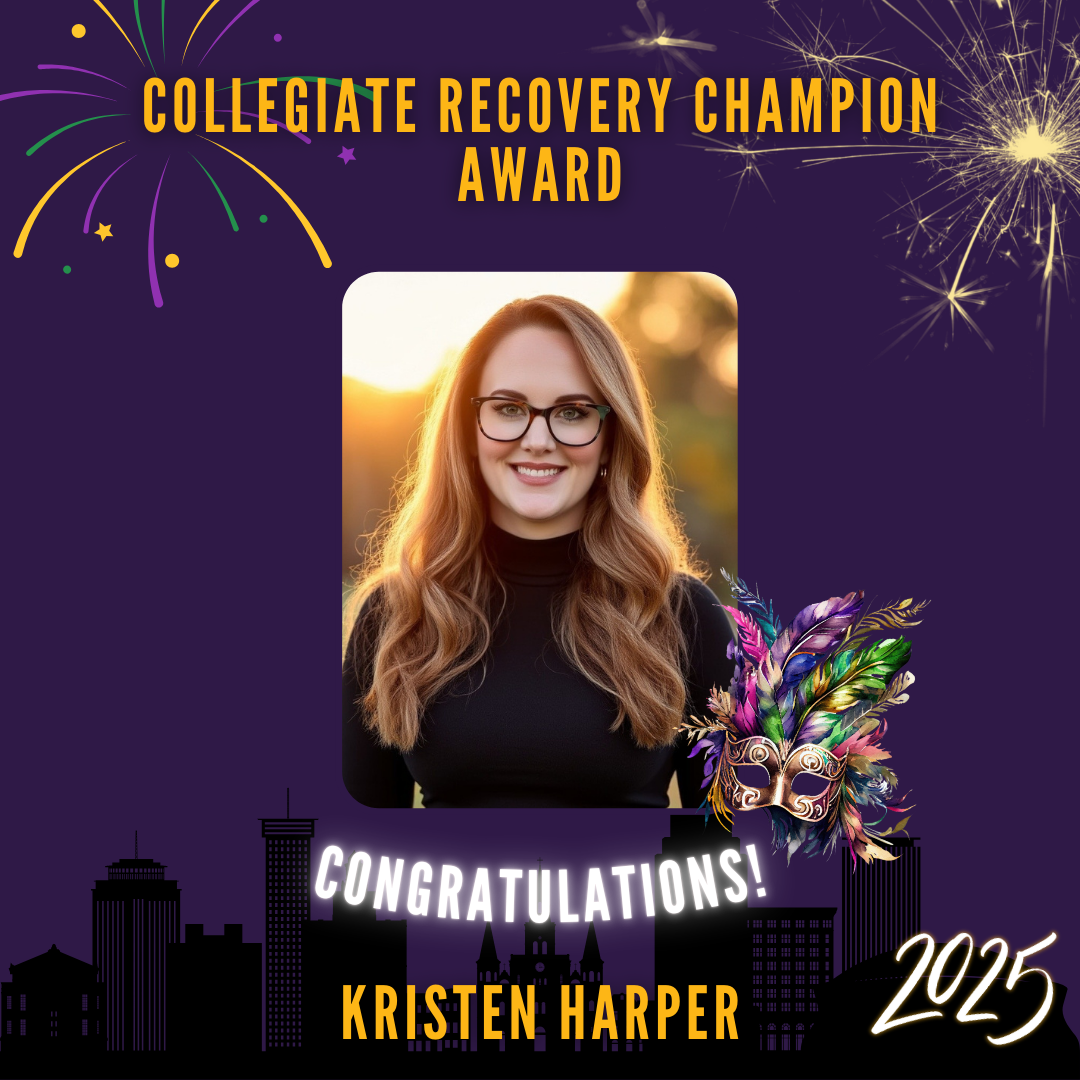
Kristen Harper
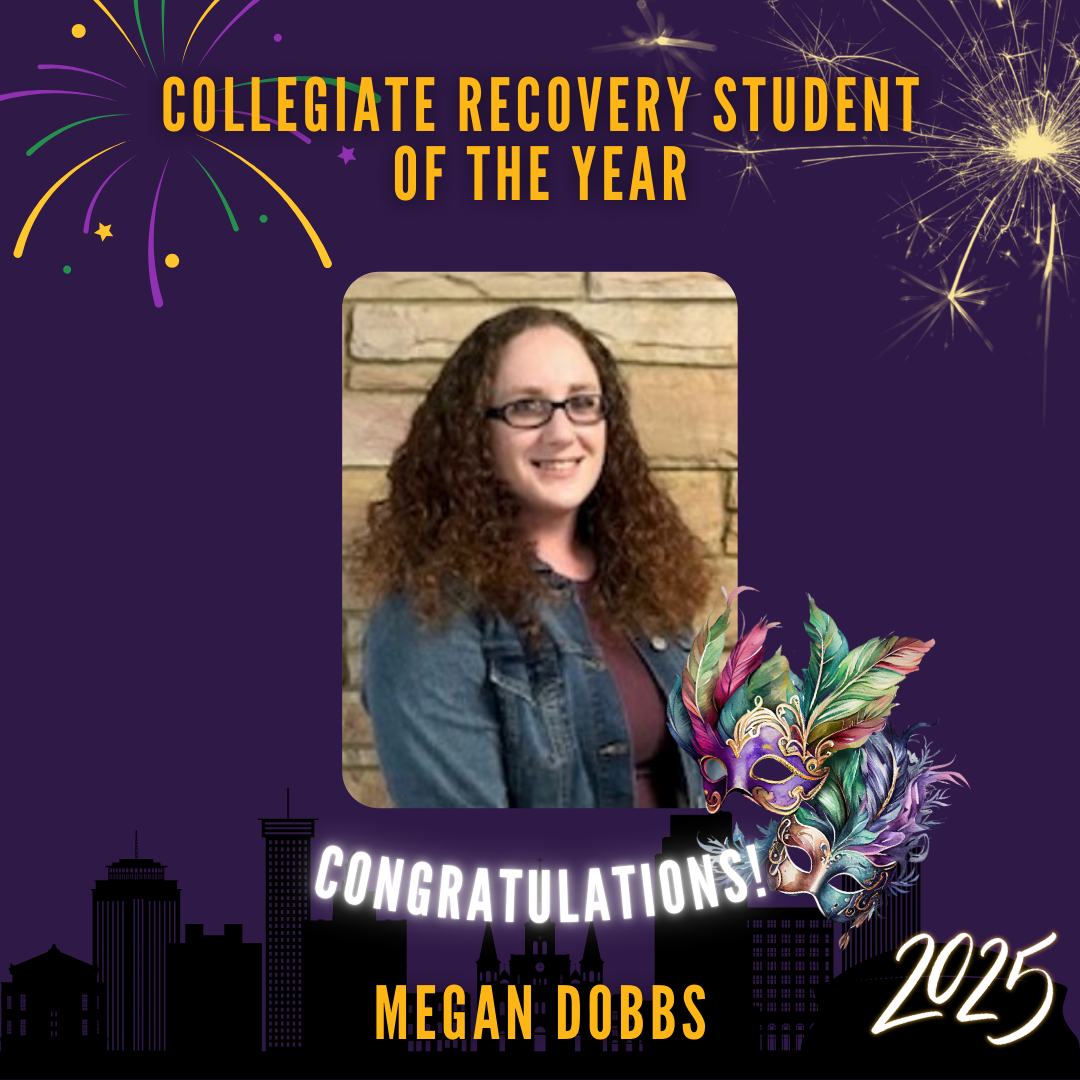
Megan Dobbs
Collegiate Recovery Student of the Year – Honors an undergraduate or graduate student who has displayed excellence in academics and leadership to the field above and beyond designated work/study responsibilities.
“Being a part of Collegiate Recovery has been the most life changing experience since beginning my higher education journey. Since connecting with Collegiate Recovery during my first week on campus, it gave me this overwhelming feeling of belonging that I had not had before. Recovery means freedom for me, and I was not sure if being a student in recovery, if I would be welcome on a higher education campus, but Collegiate Recovery shut down all of my fears and the last three years of growth throughout my college journey with their support and guidance has been phenomenal. I am overwhelmingly grateful.”
I am a state certified Peer Recovery Support Specialist, and also a person living in long term recovery from SUD since May 18, 2021. I have worked with the WV Collegiate Recovery Network since March 2023 from Bluefield State University and Concord University working to support individuals in recovery to success in higher education. I enjoy assisting students in recovery navigating their way through higher education. I have been a Bonner Scholar with Concord University for 3 years putting in service work in the community with underserved populations and giving back in any way I can. In addition to my work, I am a proud mentor with Camp Mariposa, a monthly year-round camp who supports our youth who have been affected by substance use disorder. Being a part of our camper’s growth and helping to teach them that they did not cause it, they cannot cure it, but they can take care of their
selves in the process heals a part of me as well. I am a junior at Concord University working towards my bachelor’s degree in social work with a minor in psychology. I enjoy any opportunity I get to give back to my community and work towards reducing the stigma associated with SUD.
Collegiate Recovery Student of the Year – Honors an undergraduate or graduate student who has displayed excellence in academics and leadership to the field above and beyond designated work/study responsibilities.
“I went from being in prison for three years—and in the prison of my addiction for a decade before that—to earning an associate degree, a bachelor’s, and now pursuing my master’s in counseling. It wasn’t until I found Collegiate Recovery that I truly believed I could make it through—and that I was worth it. I’ll never forget when I realized I wasn’t the only felon on campus, and that through recovery, I wouldn’t have to walk alone.
Fast forward a few years: now I’m a coordinator with Lion Up Recovery, volunteering with ARHE, and surrounded by students and mentors who have impacted my life immensely. I’ve learned that I not only deserve to live again, but I can also use my experience to help others believe they do too. I’m not just leaving school with degrees and credentials—I’m leaving with my life back”
Coordinator of Intervention and Collegiate Recovery Programming at Southeastern Louisiana University, SLU Alumni, and Provisionally Licensed Counselor
Bryan has been part of the Collegiate Recovery Program since 2018 and directly credits the program for his academic and personal success. He attended the inaugural board meeting during the inception of Lion Up Recovery and has remained an active leader ever since. Bryan earned his B.A. in Psychology from SLU in Spring 2021 and will graduate with his Master’s in Counseling in 2025.
As a coordinator and person in long-term recovery, Bryan has championed recovery-supportive services including group facilitation, campus-wide presentations, training, and committee work, both at SLU and with the Association of Recovery in Higher Education (ARHE). He currently serves on ARHE’s Advisory Council and is involved in a variety of volunteer initiatives.
Bryan’s recovery journey is rooted in service, family, synagogue, exercise, and meditation. He believes that true collegiate recovery requires nurturing every part of student life—and beyond.
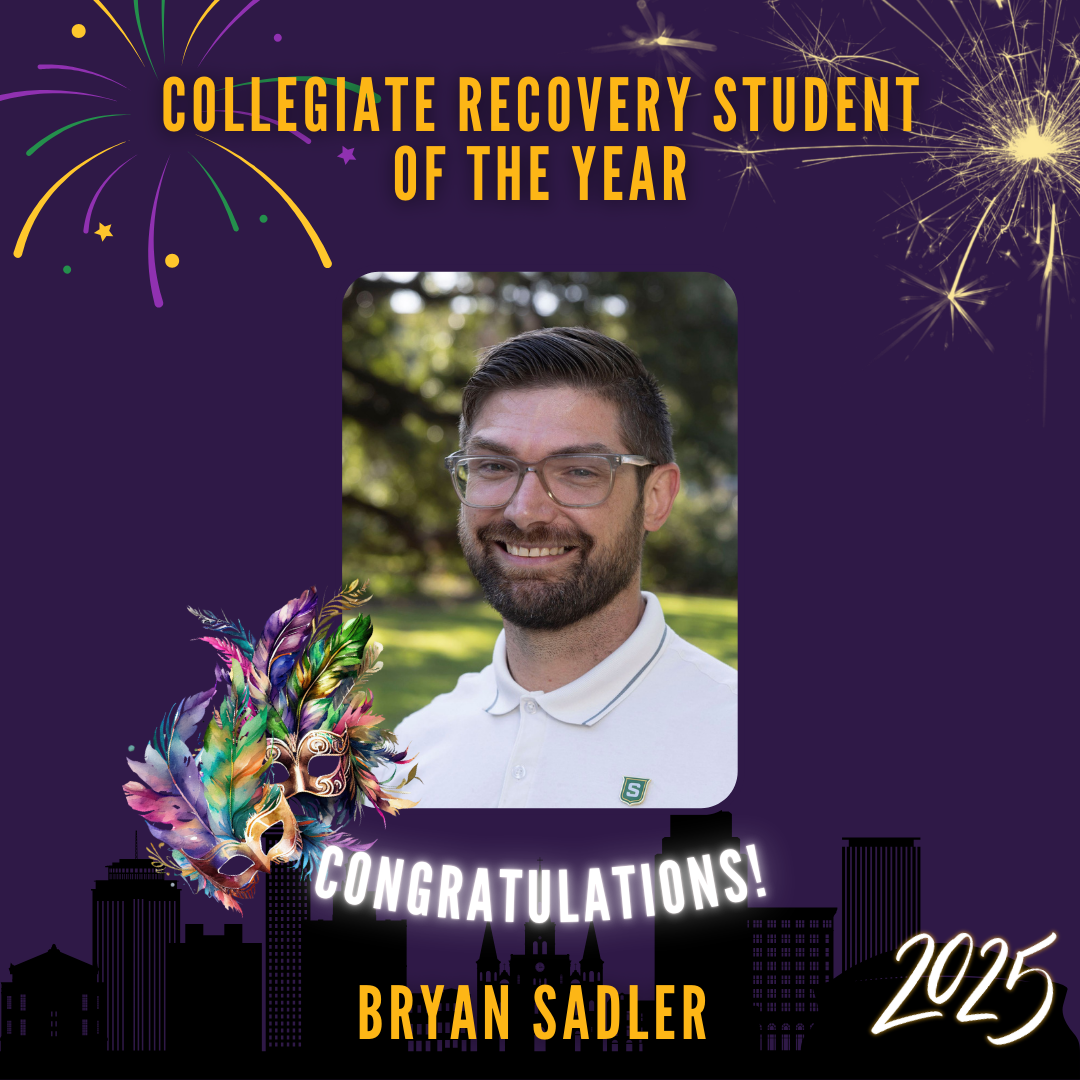
Bryan Sadler
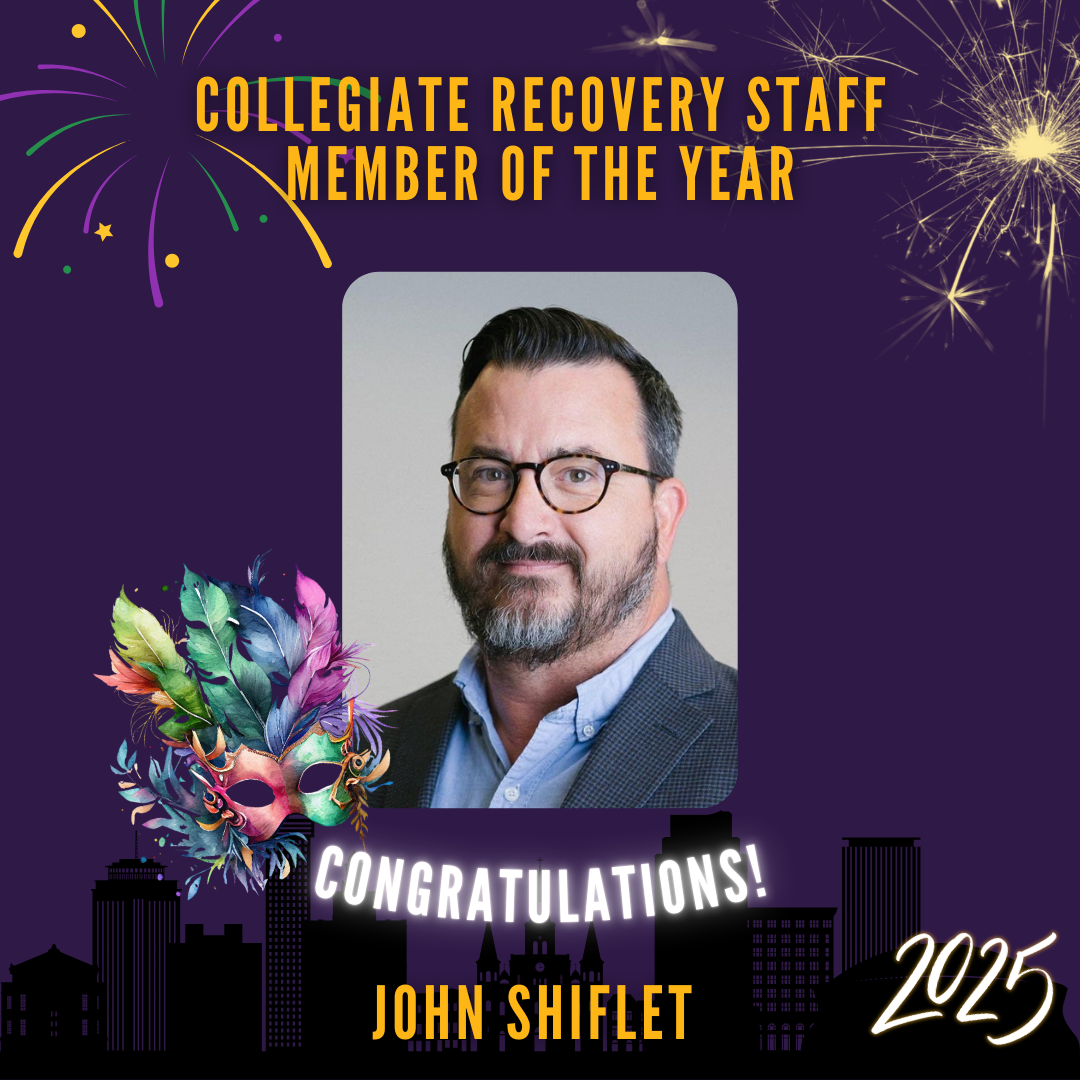
John Shiflet
Collegiate Recovery Staff Member of the Year – Honors a college or university staff member who has displayed support and commitment to a collegiate recovery program beyond the designated level of expectation.
“Receiving the Collegiate Recovery Staff Member of the Year Award at the 16th Annual Collegiate Recovery Conference is an incredible honor. This award is extremely special to me because I am a product of collegiate recovery and would not be where I am today without the guidance and mentorship of the staff at Texas Tech University Center for Students in Addiction Recovery. Also, it reaffirms my belief in the transformative power of collegiate recovery programs and how impactful collegiate recovery can be. Supporting students in their journey to recovery is not just a professional commitment, but a deeply personal mission to foster resilience and hope for students in recovery.”
John Shiflet is a person living in long-term recovery since May 1, 2007. In 2008, John was accepted as a student into the Center for the Study of Addiction and Recovery at Texas Tech University. John graduated from Texas Tech University with a bachelor’s degree in Community, Family, and Addiction Services in December of 2012. In 2013, John became the director of the collegiate recovery community, Cougars in Recovery, at the University of Houston. In May 2019, John earned a Master of Social Work degree with a clinical focus from the College of Social Work at University of Houston. John is pursuing a doctoral degree in Higher Education Leadership and Policy in the College of Education at the University of Houston. He recently was named the Director of Collegiate Recovery Service Aggie Recovery Community at Texas A&M. Throughout his career, he has demonstrated a compassionate and empathetic approach to serving and supporting students facing substance use and mental health disorders. His unwavering dedication to this cause has helped countless students achieve their goals, overcome obstacles, and discover a path to recovery.
Collegiate Recovery Staff Member of the Year – Honors a college or university staff member who has displayed support and commitment to a collegiate recovery program beyond the designated level of expectation.
“I support collegiate recovery because I’ve seen how powerful it is when campus members are supported in both their education, work, and recovery. I know how isolating recovery can be in academic spaces. That’s why I’m committed to creating communities where students and staff feel seen, supported, and valued. Receiving this award is meaningful because it reflects the growing recognition of collegiate recovery in Canada and internationally, as well as the strength of the community behind it.”
Chelsie Graham is a registered social worker and University of Calgary BSW graduate, currently serving as Manager of Recovery on Campus (ROC) Alberta and the UCalgary Recovery Community. Chelsie is a national leader in creating inclusive, recovery-friendly spaces across post-secondary campuses. Drawing on both lived experience and her social work background, she champions all pathways to recovery, including substance use and behavioral addictions, while reducing stigma, mentoring peers, and equipping communities to better support one another.
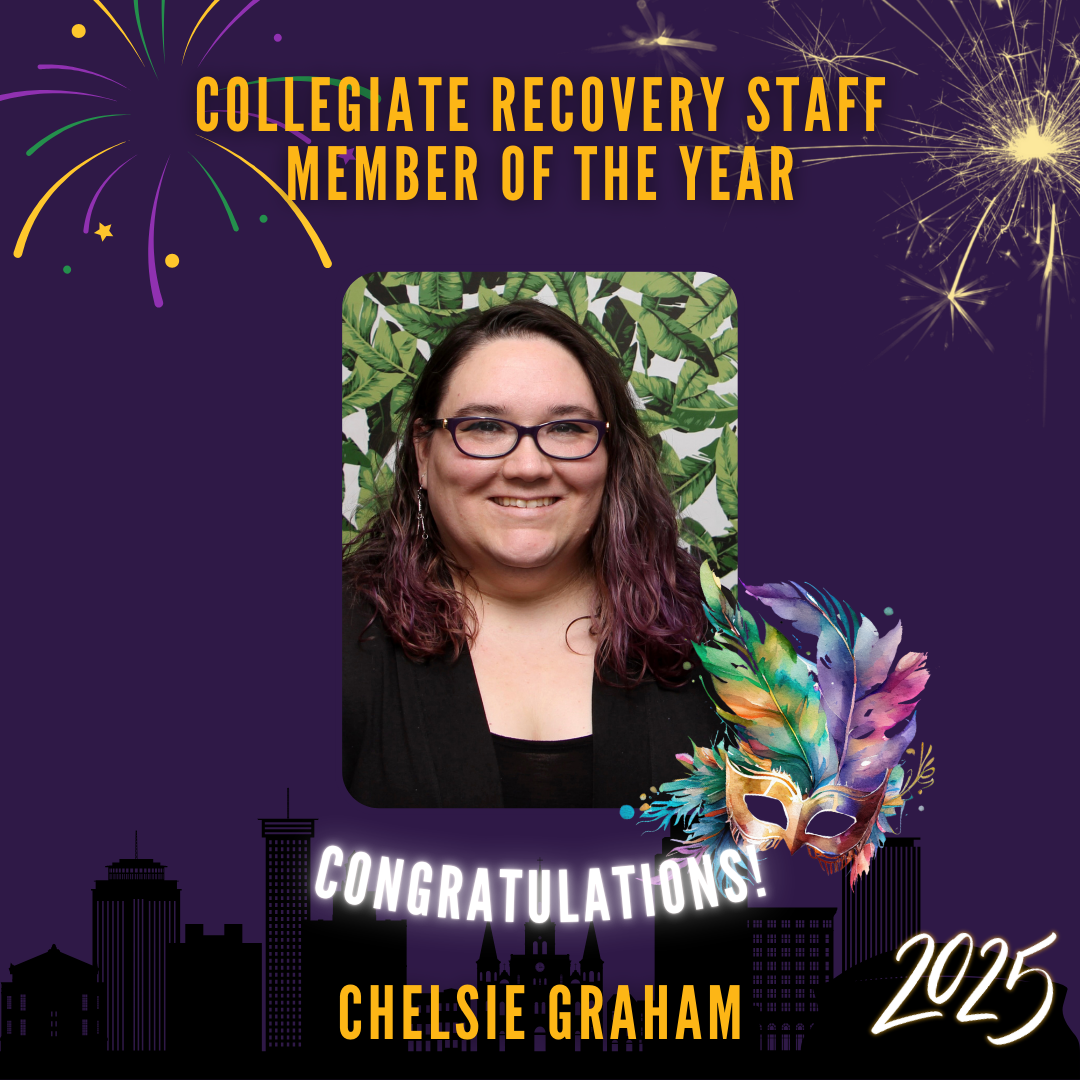
Chelsie Graham
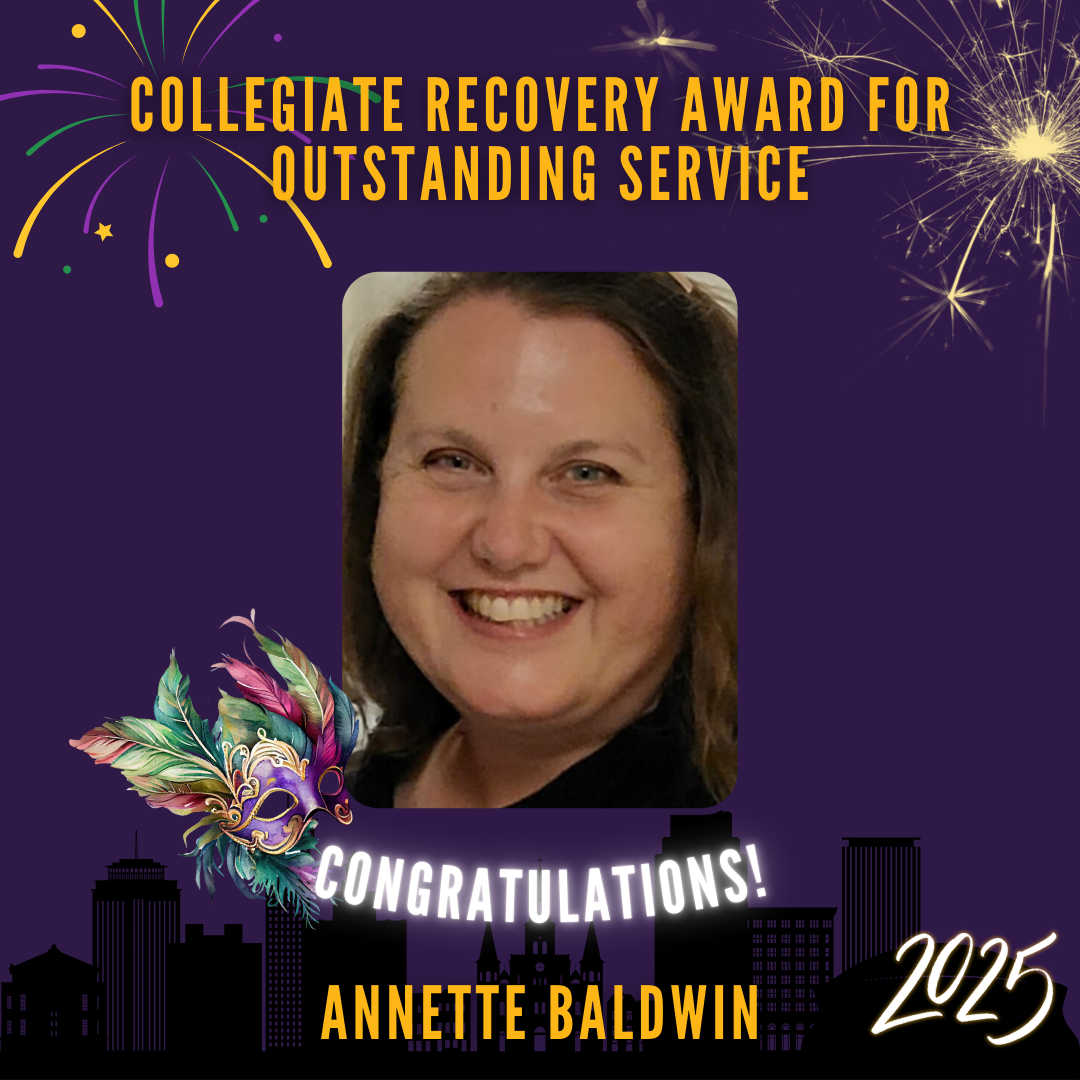
Annette Baldwin
Collegiate Recovery Award for Outstanding Service – Honors an individual who goes above and beyond in their service efforts for the continued advancement of collegiate recovery.
“Working in Collegiate Recovery is a great way to give back to those who have supported my recovery.”
Annette Newton-Baldwin is the Assistant Director of the LION UP Recovery Program (Collegiate Recovery Program) and Intervention at Southeastern Louisiana University, where she has been employed since 2003. She is a Licensed Professional Counselor and a Licensed Marriage and Family Therapist. In 1997, Annette earned a Master of Arts in Counseling from the University of Louisiana at Monroe. Annette is a native of Slidell, Louisiana.
Annette launched LION UP Collegiate Recovery Programming at Southeastern Louisiana University in 2019. Currently, as project director of the Louisiana Collegiate Recovery Expansion Grant through the Louisiana Department of Behavioral Health, she assists in building sustainability with five Collegiate Recovery Programs across Louisiana. She has presented on collegiate recovery at numerous conferences, including the NASPA Strategies Conference, The University of Louisiana’s Third Annual For Our Future Conference, The Louisiana Substance Abuse Counseling Conference, and The Louisiana College Counseling Association.
Annette’s service involvement includes serving as TRACC Coalition Chair the alcohol and drug prevention organization for Tangipahoa Parish. She also directs the yearly Roomie’s Merry Market, a fundraiser for the LION UP Collegiate Recovery program. She has also served as Chair for the Southeastern Collegiate Recovery Summit and Louisiana Recovery Capital Conference. She is also the past president of the Junior Auxiliary of Hammond.
She has also served on the Board for the Association for Recovery in Higher Education as the Southeast Rep and Finance Committee. She completed the 2018 Leadership Tangipahoa program.
One of Annette’s most cherished roles is as a mother to her daughter, Gabrielle Baldwin.
Collegiate Recovery Advocate of the Year – Honors an individual who has tirelessly advocated for the implementation, advancement, and sustainability of collegiate recovery at a local or national level.
“It is a distinct honour and a privilege to be selected as ARHE’s “Recovery Advocate of the Year,” especially considering how many incredible people work in the collegiate recovery field. I am humbled by the recognition, and motivated to continue my efforts to make recovery accessible to everyone who wants it. Thank you!”
Dr. Onawa LaBelle is an Associate Professor of Psychology at the University of Windsor and the founder and faculty advisor of Lancers Recover, the first student recovery program in Ontario, Canada. She is also the co-director of the Center for Addiction Recovery Support, funded by the Office of Recovery at the Substance Abuse and Mental Health Services Administration. With lived experience in addiction recovery since 2005, she has utilized various methods to sustain her journey, including 12-step programs, She Recovers, and Recovery Dharma, among others. Dr. LaBelle earned her Ph.D. and M.S. from the University of Michigan and a B.A. from Smith College, all in Psychology. Her educational path highlighted the impact of formal recovery support, as she experienced both its absence and presence during her studies. Since moving to Canada, Dr. LaBelle has become a leading advocate for collegiate recovery, actively working to expand the movement nationwide.
In her research, Dr. LaBelle integrates positive psychology and her personal experiences to explore recovery from alcohol and substance use disorders. Dr. LaBelle regularly lectures on topics related to recovery to mobilize knowledge and translate research findings to the public. She is passionate about sharing her expertise and experience to help individuals and communities affected by addiction.
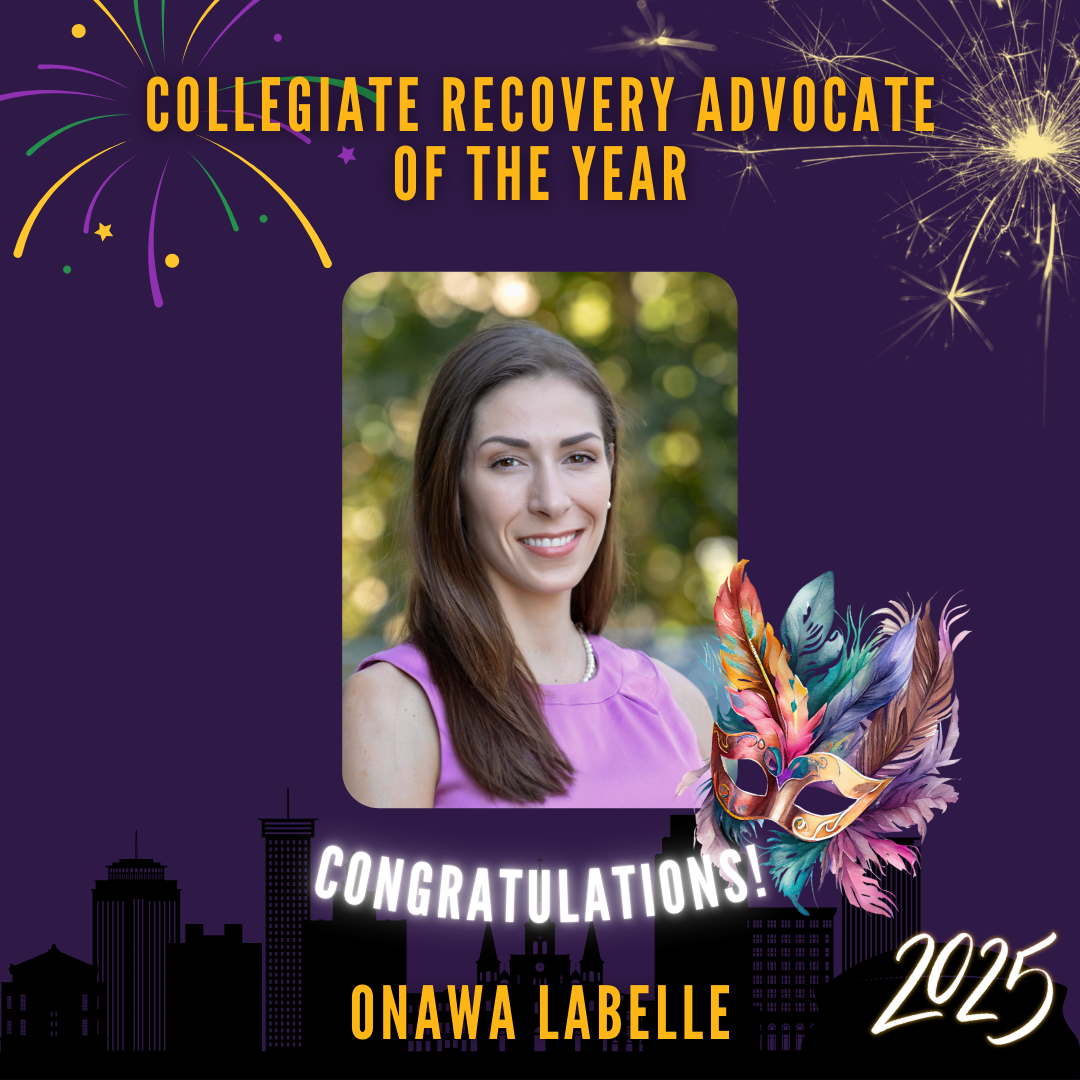
Onawa LaBelle
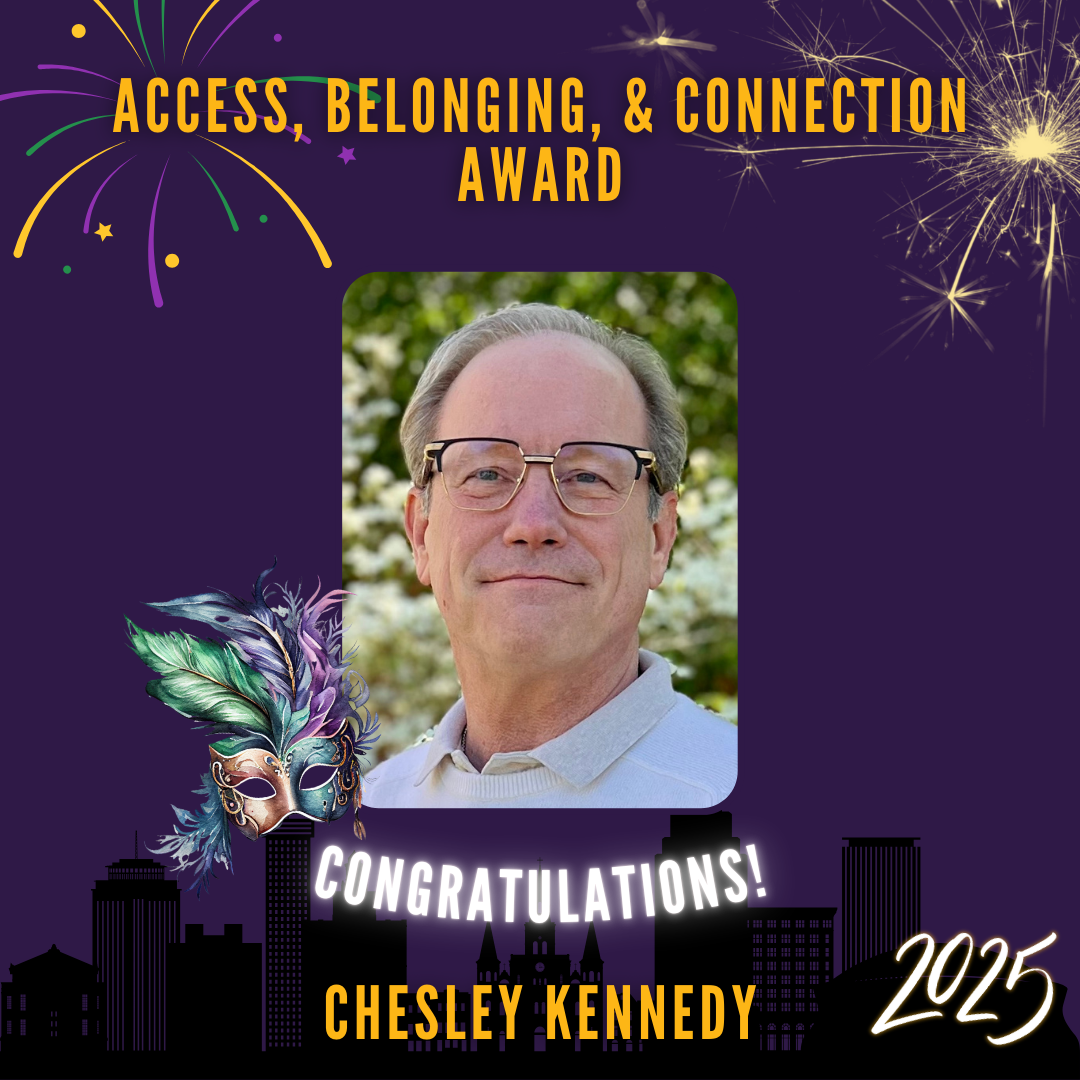
Chesley Kennedy
Access, Belonging, and Connection Award – Honors an individual who has aided in the advancement of EDI and SJ in the field of collegiate recovery for BIPOC and/or 2SLGBTQIA+ students or has displayed a strong commitment to these populations in the wider recovery communities.
“In a year where Equity, Diversity, and Inclusion and Social Justice have faced political challenges, I am deeply honored to receive the ARHE Access, Belonging, and Connection Award. This recognition reaffirms the importance of welcoming individuals into our lives who are different from us and who may not share the same experiences or perspectives. It is always the right thing to do, and it is through these connections that we build a more inclusive and just world.”
In March 2020, Chesley Kennedy was appointed the Coordinator of the Spartan Recovery Program at UNC Greensboro, an effort established in 2015 to engage students in recovery from alcohol and other drugs. Prior to this, he worked at UNCG in University Advancement as the Director of Development for the College of Arts & Sciences. “Ches” earned a Bachelor of Arts from UNC Greensboro in Religious Studies and a Master of Divinity from Duke Divinity School. Ches is a Licensed Clinical Addiction Specialist (LCAS). He is the pastor of Heidelberg United Church of Christ in Thomasville, NC. Ches has served on the board of directors of Friends for an Earlier Breast Cancer Test, Partners Ending Homelessness, and Alcohol and Drug Services. He is currently the Secretary of the Board of Addiction Professionals of North Carolina (APNC), Vice-President of the Greensboro Symphony Orchestra, member of the Board of the Southern Conference of the United Church of Christ, and the Board of Directors of The Cone Health Foundation. He lives in Greensboro with his husband John Overfield, and their Golden-Doodles Clinton and Jefferson.
ARHE Cornerstone Award for Student Support – Honors an individual or organization who has gone above and beyond to support students in recovery. The Cornerstone Award recognizes and celebrates the core of what the field is about: supporting students in recovery.
“Supporting collegiate recovery for me, is about giving back to others what was so freely given to me. I had an awesome experience as a college student in recovery (which I never thought was possible) so having the opportunity to give it back to others is the coolest thing ever.”
Blake Schneider serves as the Director of the Center for Young Adult Addiction and Recovery (CYAAR) at Kennesaw State University. Mr. Schneider received his Master’s in Communication Studies from the University of Alabama with an emphasis in group leadership, strategic intervention and social work. Prior to joining CYAAR in 2022, Schneider established the Collegiate Recovery Community at Mississippi State University in 2015. Serving in the Director position at CYAAR he has expanded capacity to provide peer support services to KSU students, reinstituted key initiatives such as recovery housing services and education abroad opportunities and has hosted several community scale events in order to bring addiction recovery professionals together. As a former professor of public speaking, Schneider presents at local, state and national conferences, summits and workshops. He serves on a variety of boards and committees including the Kennesaw State University Center for Young Adult Addiction and Recovery Advisory Board, the Kennesaw State University Wellbeing Coalition, the Tennessee Tech Advisory Board and the Kennesaw State University Beta Theta Pi Advisory Board. From the Summer of 2017 to the Summer of 2020 Schneider served as the Southeastern Representative for the ARHE. In this position, he took measures to help with the startup of collegiate recovery efforts in the Southeastern region while working to enhance collaboration and cohesion among Universities in the Southeast. His goals include advancing the Center’s impact on addiction and recovery locally and amongst the field, making Collegiate Recovery accessible and open to all students that seek support, minimizing risk for students through innovative alcohol and other drug education prevention measures and ensuring the Center’s continued contributions to the field of recovery science research. In his free time, Schneider likes to spend time with his wife and daughter, traveling, exercising, meditating, and working with mentees from a 12-step fellowship.
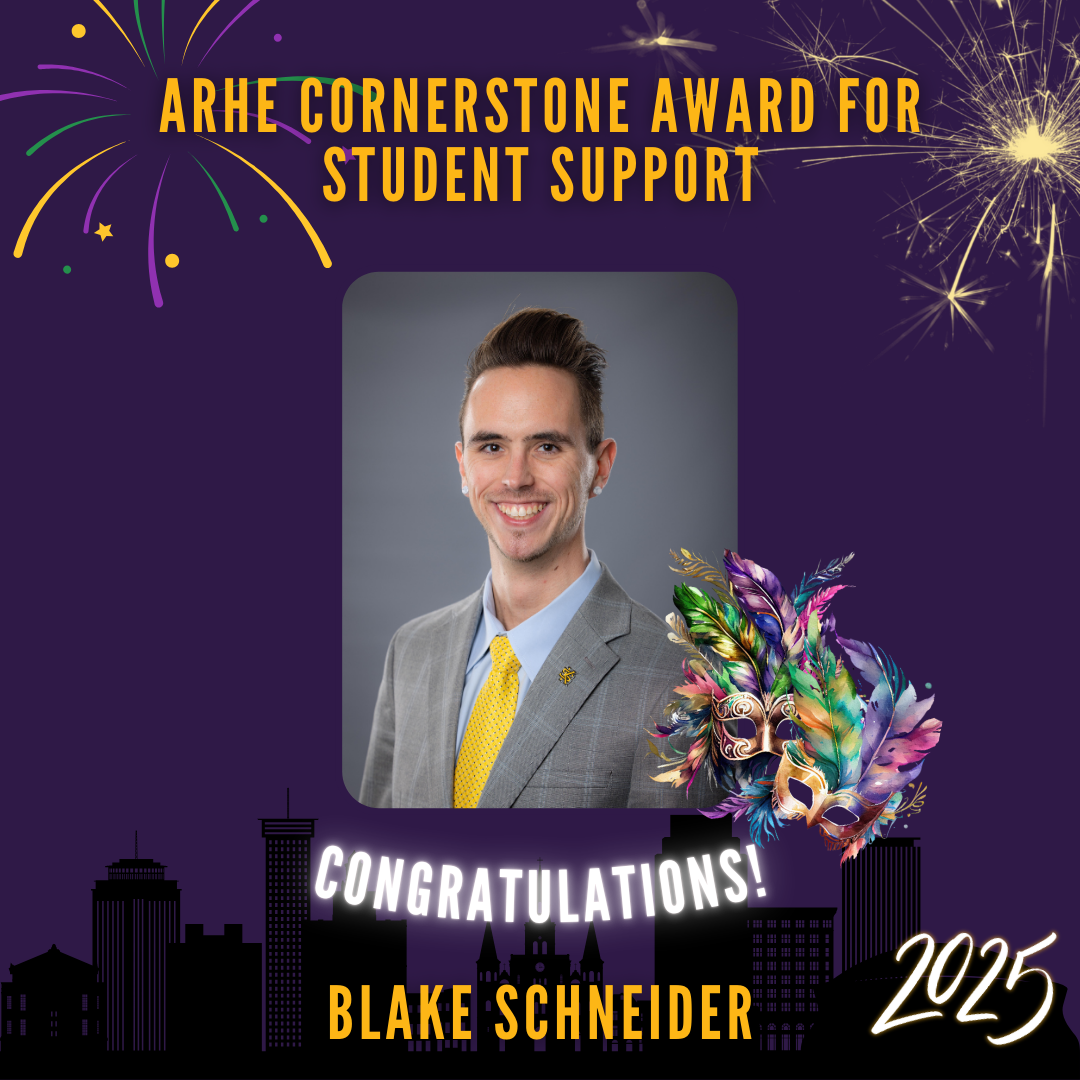
Blake Schneider
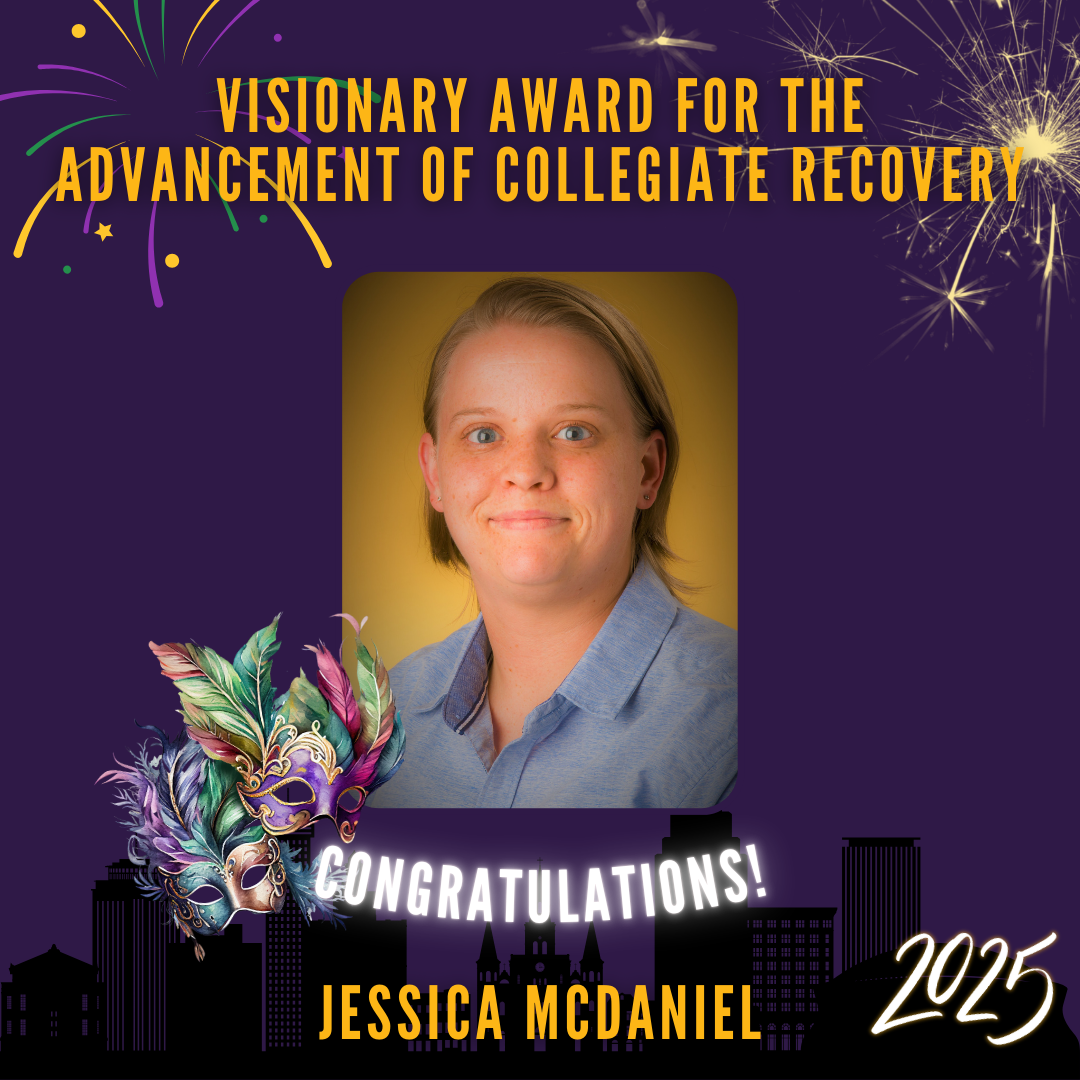
Jessica McDaniel
Visionary Award for the Advancement of Collegiate Recovery – Honors an individual or organization who has made groundbreaking and significant contributions to collegiate recovery that have advanced the profession forward in a way that significantly affects students, programs, and institutions.
“I support collegiate recovery because it transformed my life. I owe so much of who I am today to collegiate recovery and receiving this award reminds me of the giants upon whose shoulders I get to stand.”
Jessica M. McDaniel serves as the Assistant Director for Kennesaw State University’s Center for Young Adult Addiction and Recovery (CYAAR). Jessica’s interest in research emerged while she was completing her Bachelor of Science in Psychology and she began working as an undergraduate research assistant helping to establish the first research team at CYAAR. Upon graduation and throughout her Master of Arts in American Studies program, Jessica worked as the Assistant for Research Initiatives and the Research Coordinator at the Center. Now, as Assistant Director, Jessica supervises both the research efforts and recovery support services at CYAAR. Jessica published her first peer-reviewed article while an undergraduate student, and since then has published a dozen articles focused on substance use disorders (SUDs), recovery-informed theory, language and stigma surrounding SUDs, and treatment and community-based recovery support options.
ARHE Community Member of the Year – Honors an individual who has aided in the advancement of the field and/or to the specific development of a community, area, resource or topic related to recovery in higher education.
“As I transition out of the CPR coordinator role this award means so much to me. I’ve met some wonderful people who I can count on to be there if needed so I don’t feel so alone in this field. One person in particular who can’t be here is Angie Bryant. Her support and friendship have meant so much to me. Another is Daniel Fried. I honestly wouldn’t be here if not for me meeting him and realizing that I can do this on a smaller scale. So THANK YOU”
Stephanie Lake is the Alcohol Tobacco and Other Drug (ATOD) Intervention Services Coordinator for UC Davis. Stephanie has worked at UC Davis for 25 years. She received her bachelor’s degree in education with a focus on substance abuse education from Northeastern University and her Master’s in Education with a focus on substance abuse counseling from University of Massachusetts, Boston. She is currently a Licensed Advance Alcohol and Drug Counselor from California Consortium of Addiction Program and Professionals (CCAPP).
Her role at UC Davis is to work with students to empower them to make healthy and responsible choices concerning the use of alcohol, tobacco, and other drugs. She conducts individual assessments, educational groups, relapse prevention counseling, and one on one smoking cessation. One of her biggest joys has been being the CRP Coordinator for Aggies for Recovery for the last 10 years.
She started this group in the Fall of 2015 with a Transforming Youth Recovery Grant. The name was originally Aggie RISE (Recover, Inspire, Support Empower). Since it was a student run group, they felt other Aggies wouldn’t know what the group was about so changed the name to Aggie 4 Recovery. Ater 5 years she lost the funding for her program and has managed to continue to keep the program not only growing but thriving. Her job required that only 5% of it is to promote the CRP. She’s been able to secure funding for 2 Student Coordinators and been able to host many wonderful events with help from other partnerships that she’s formed on the campus. Her biggest pride and joy has been seeing one her former student coordinator go on to be the CRP coordinator for UC Berkely for a few years before deciding to go grad school.
She’s also been able to be a part of the ARHE Advisory Council from the inception and helped write the guiding charter and is still involved with the Harm Reduction group. She is passionate about helping students in any stage of recovery. She’s presented at many local and national conferences around harm reduction and how to get a CRP started with fellow ARHE Members. ARHE is one of the reason’s she hasn’t given up when she felt very alone in her job as her boss and big boss didn’t understand her work. Through ARHE she had a place to come and have others understand her.
She’s also been regional Rep for ARHE for a year where she helped new programs with technical assistance.
She was the co-chair and chair for years of the UC Wide Collegiate Recovery meeting that meet monthly to promote CRPs throughout the UC System. She helped spear head the charge for all UCs to have a FULL TIME CRP Coordinator. She’s now in the process of training the CRP Coordinator at UC Davis who started on April 15, 2025
She recently started her own private practice working primarily with young adults and teens around substance abuse and trauma. She uses a model call Comprehensive Resource Model (CRM).
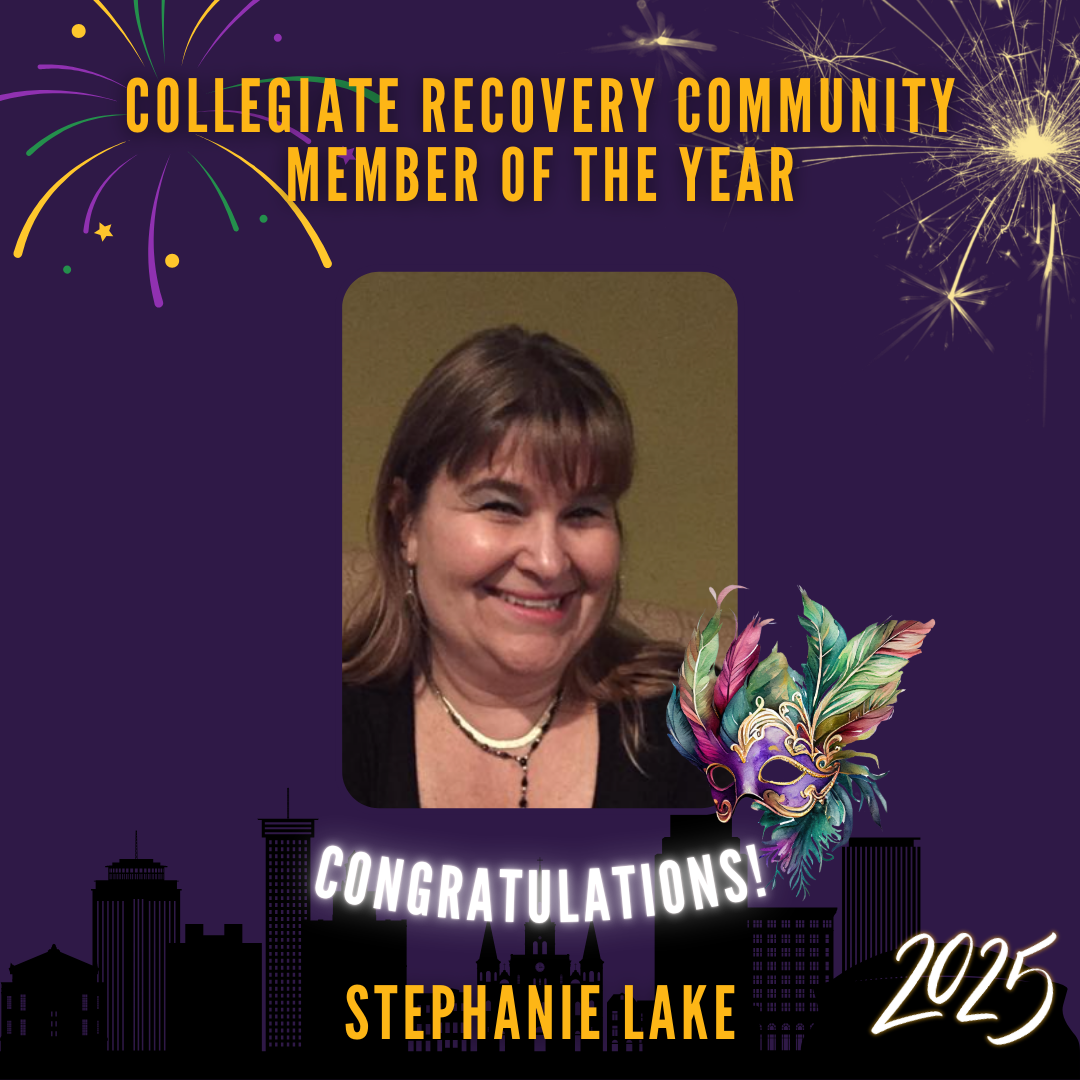
Stephanie Lake
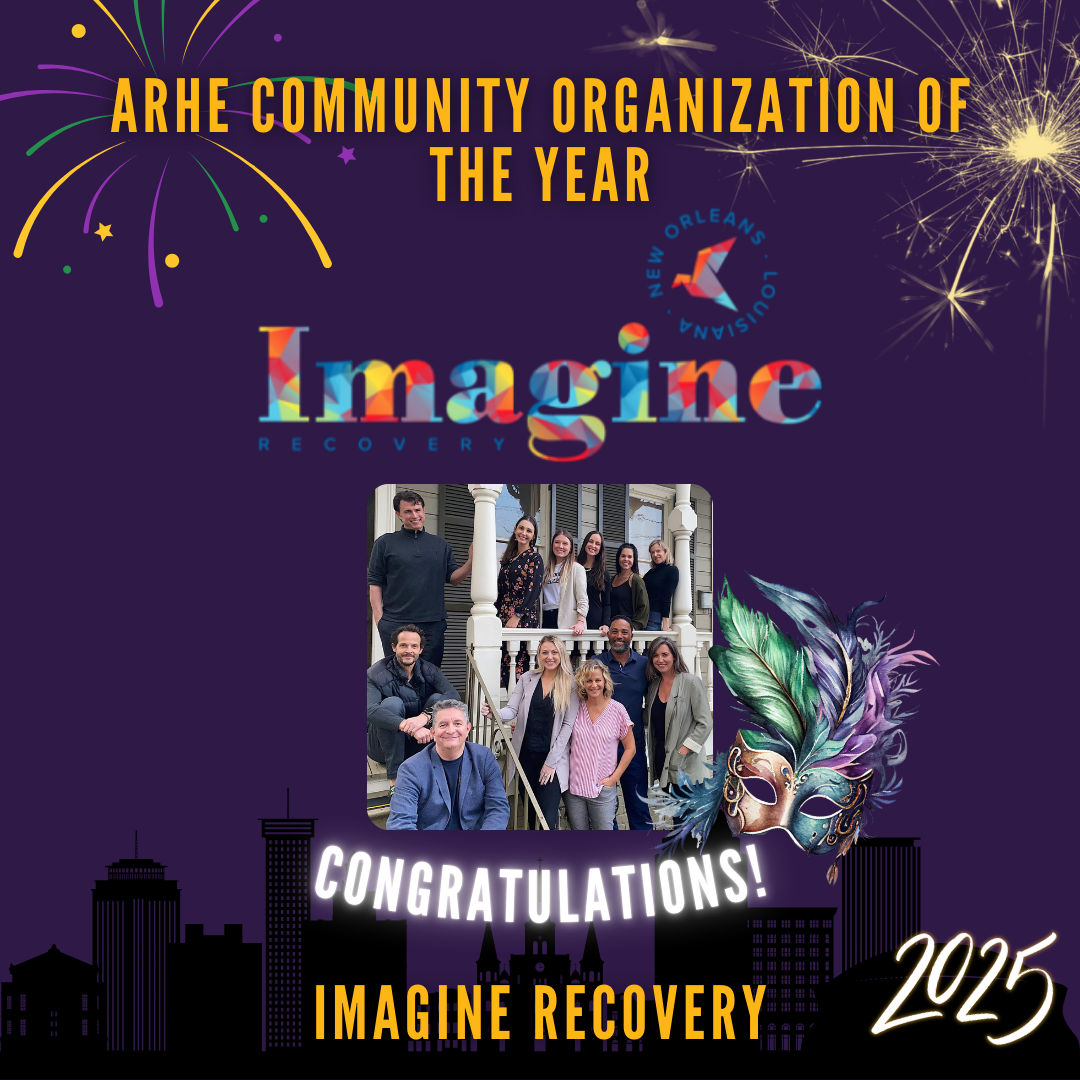
Imagine Recovery
ARHE Community Organization of the Year – Honors an organization who has aided in the advancement of the field and/or to the specific development of a community, area, resource or topic related to recovery in higher education.
ARS Award Winners
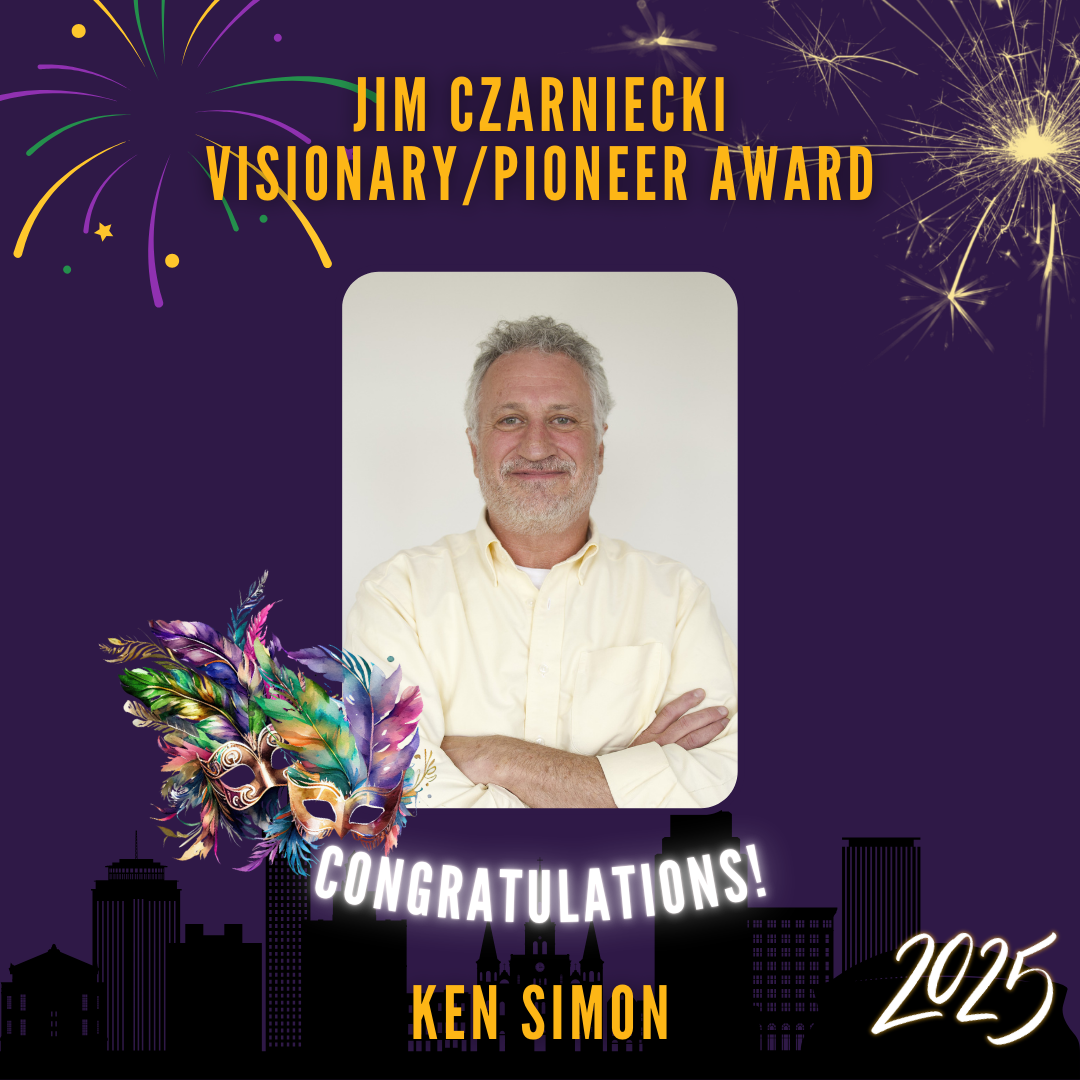
Ken Simon
Jim Czarniecki Visionary/Pioneer Award – Jim Czarniecki was the CEO of Sobriety High from 1998 to 2005, and he envisioned a sober school in every community. He was a leader in the development of the Association of Recovery Schools and did more than anyone else in his time to develop and promote recovery high schools across the world, including helping start the Massachusetts schools and an effort to launch a school in Russia. He died of cancer in July 2006, just days before the annual conference that year at Texas Tech. ARS dedicated the Jim Czarniecki Visionary Award to honor visionaries and to recognize his immense impact on the establishment of the recovery high school movement. When Minneapolis hosted the conference in 2007, ARS gave the award to Czarniecki, posthumously, and his widow, Kitty, delivered an emotional acceptance speech.
Ken has over 30 years of experience working in education. Throughout his career, his passion and focus have been on ensuring that all students have access to deeper and more meaningful learning experiences. He began his journey as a social studies classroom teacher and has served as a curriculum/instruction leader, coach, district leader, and professional development provider across many content areas. Over the course of his career, he has collaborated with other educators to lead the development of four new schools beginning with P.E.A.S.E. academy, a High School for sober students. He was a school designer for Expeditionary Learning (EL Schools), where he helped lead the development of MESA, a 6-12 Gates-funded small school. For Minneapolis Public Schools he has served as a teacher, middle school reform coordinator, and director of secondary schools. He also served as the Chief Learning Officer for World Savvy, a national global education organization. He is currently the Director of Leadership for the Institute for Educational Leadership (IEL), where he works with school leadership teams to create democratic governance models to bring students, parents, and teachers to the decision-making table. He has conducted workshops and presentations on equity, pedagogy, assessment, global and cultural competence, and social studies and science content.He is also a published curriculum writer and teaches both undergraduate and graduate-level courses for teachers and principals.
Stacie Mathewson Guardian Angel Award – As the founder of the Stacie Mathewson Foundation, Stacie focused on promoting addiction awareness, recovery, prevention and education at the local, state, and national level, including making a major investment in both recovery high schools and collegiate recovery communities in the 2010s. Stacie was both professionally and personally connected to the cause, witnessing since childhood how addiction disease can tear families apart and span generations. With the loss of a son who first faced the disease of addiction in his early adolescence, Stacie’s commitment to preventing addiction and protecting the health of our youth was unrelenting. A new award was created in 2015 called the Stacie Mathewson Guardian Angel Award to honor an advocate that makes an impact, and she was the first recipient.
Patty McCarthy, M.S., is the Chief Executive Officer of Faces & Voices of Recovery, a national recovery advocacy organization based in Washington, D.C. Prior to joining Faces & Voices, she was a senior associate with the Center for Social Innovation (C4), where she served as a deputy director of SAMHSA’s BRSS TACS initiative. Ms. McCarthy served for a decade as the director of Friends of Recovery-Vermont (FOR-VT), a statewide recovery community organization conducting training, advocacy and public awareness activities. In addition to public policy and education, her work has focused on community mobilizing, peer-based recovery support services, and peer workforce development. Ms. McCarthy has been instrumental in the development of a national accreditation for recovery community organizations and in the development of peer support standards. Ms. McCarthy holds a master’s degree in community counseling and a bachelor’s degree in business administration. She has been in long-term recovery from alcohol and drug addiction since 1989.
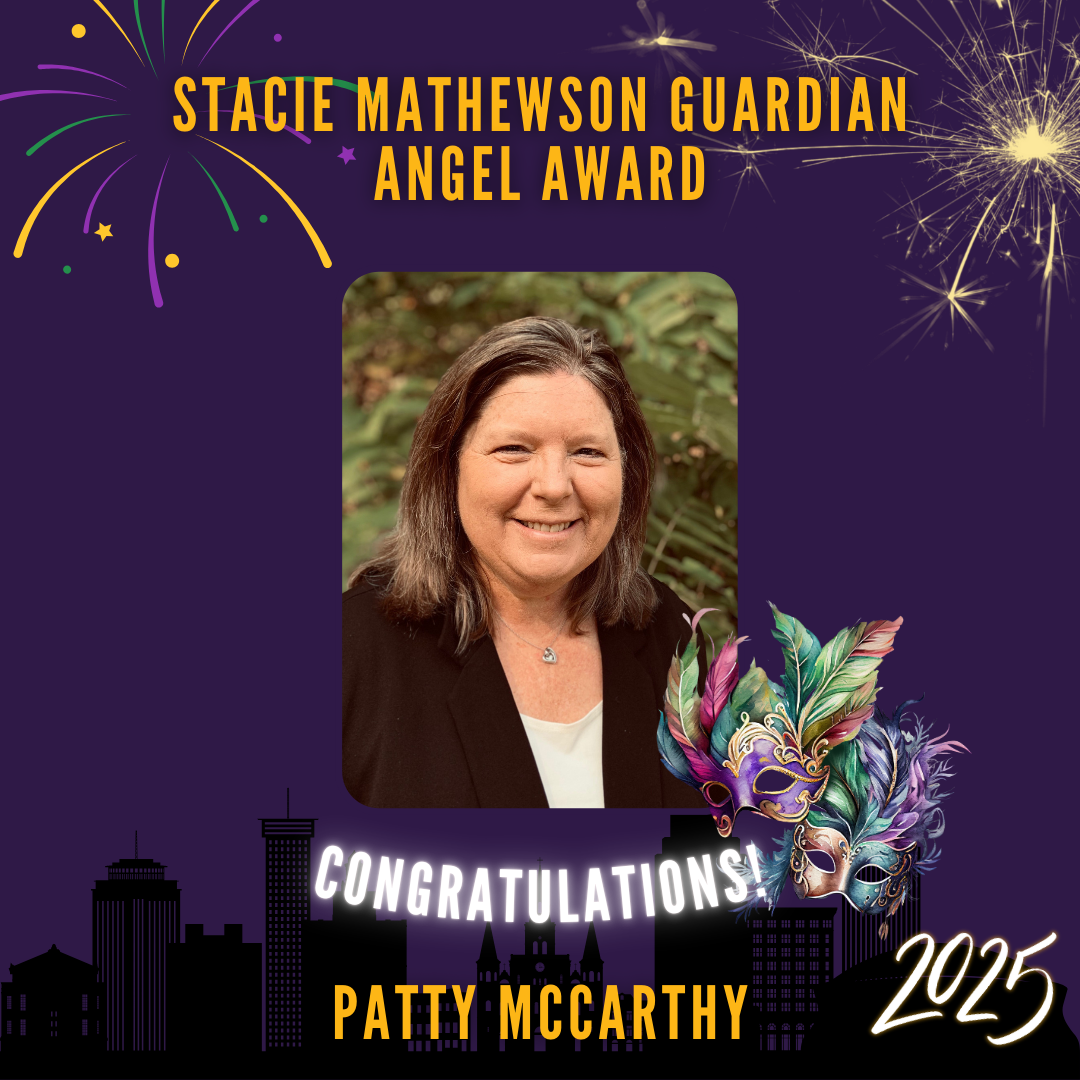
Patty McCarthy
AAPG Award Winners
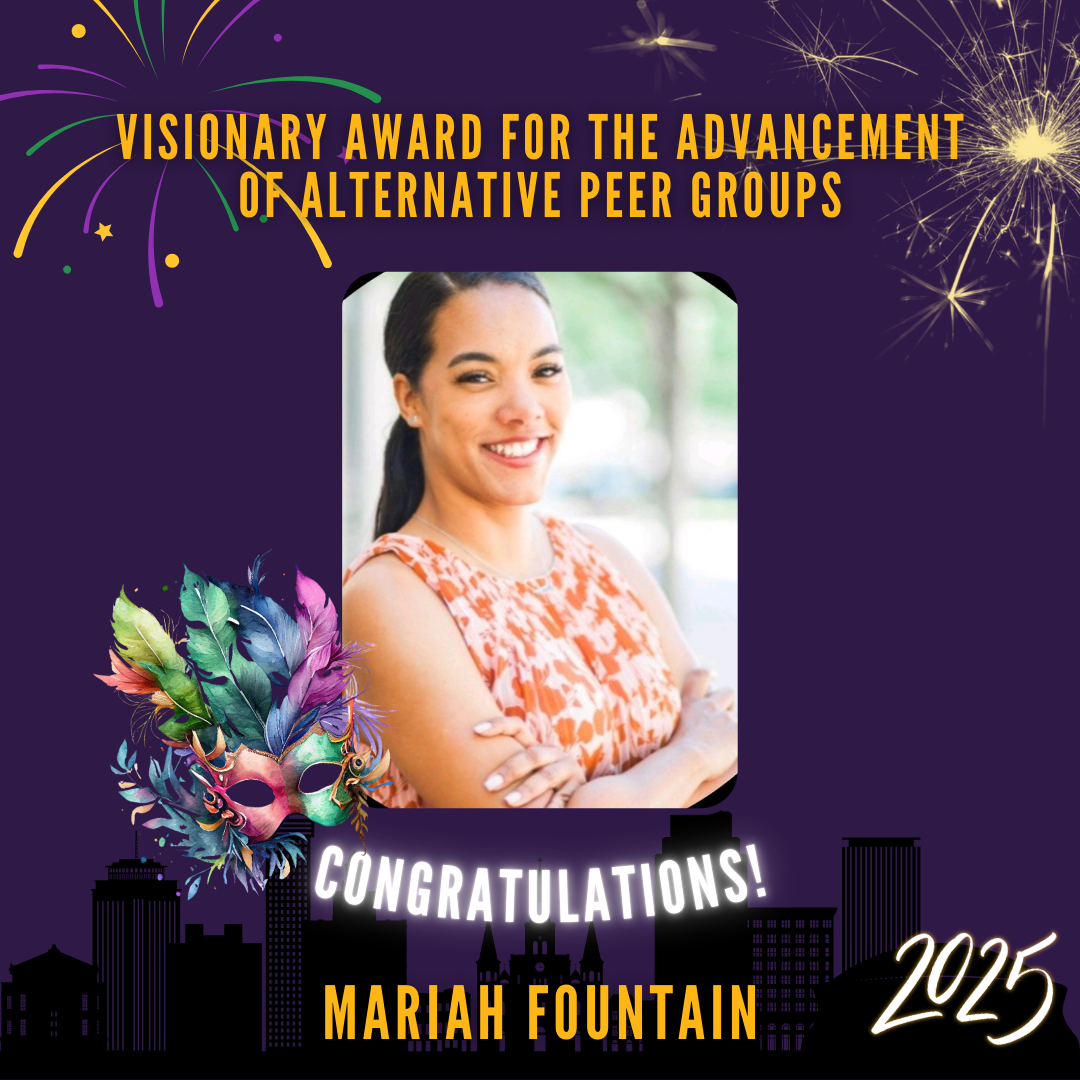
Mariah Fountain
Visionary Award for the Advancement of Alternative Peer Groups – The Association of Alternative Peer Groups (AAPG) proudly presents the 2025 Visionary Award, honoring individuals that have made groundbreaking contributions to the APG community. This award recognizes exceptional leadership, innovation, and dedication in expanding the APG model and ensuring that young people and families have access to meaningful, peer-driven recovery support.
Award recipients embody:
- A commitment to the mission and values of AAPG
- Significant contributions to the growth and sustainability of APGs
- A spirit of excellence and innovation in addiction recovery
Join us in celebrating those shaping the future of alternative peer groups.
Mariah Fountain is a dynamic leader, Licensed Master Social Worker, and the Program Director of the Palmer Drug Abuse Program (PDAP) in Houston, Texas. With a heart for healing and a gift for connection, Mariah has transformed PDAP into a vibrant, welcoming space where teens, families, and staff thrive together in recovery.
Known for her infectious energy and compassionate leadership, Mariah has redefined what it means to create a safe and supportive environment in the world of youth recovery. She has been instrumental in elevating PDAP’s family programming—expanding parent support groups, introducing innovative healing opportunities, and strengthening the foundation of the Alternative Peer Group (APG) model. Her work has offered hope, tools, and connection to countless caregivers and families.
Mariah is also a nationally recognized voice in the recovery community, frequently speaking at conferences and mentoring the next generation of professionals. Her leadership style blends deep professional expertise with a genuine, joyful spirit that uplifts everyone around her.
With a background in trauma-informed care and extensive experience across mental health clinics, psychiatric inpatient units, schools, and residential treatment centers, Mariah is committed to removing barriers to access and ensuring that all families receive high-quality, compassionate support.
Her visionary approach and unwavering commitment to teens and families have made her a beacon of hope in the Houston recovery community—and beyond.
Visionary Award for the Advancement of Alternative Peer Groups – The Association of Alternative Peer Groups (AAPG) proudly presents the 2025 Visionary Award, honoring individuals that have made groundbreaking contributions to the APG community. This award recognizes exceptional leadership, innovation, and dedication in expanding the APG model and ensuring that young people and families have access to meaningful, peer-driven recovery support.
Award recipients embody:
- A commitment to the mission and values of AAPG
- Significant contributions to the growth and sustainability of APGs
- A spirit of excellence and innovation in addiction recovery
Join us in celebrating those shaping the future of alternative peer groups.
Becky Ahlgrim is a woman in recovery from drugs and alcohol for the last 30 years and in recovery from compulsive overeating for 20 years. She’s also a mother in parent recovery for the last 31 years, starting at Palmer Drug Abuse Program (PDAP) Memorial Houston satellite and a grateful wife for 45 years. Currently a certified Peer Recovery Support Specialist (PRSS) since 2010 and a Recovery Support Peer Specialist (RSPS), Becky started her career as a special education teacher with a degree in child psychology from the University of Texas at Austin in 1991. After thirteen rewarding years as a teacher, she served as the lead recovery coach at Archway Academy in Houston for seven years and enjoyed working with students addressing their recovery growth in the educational environment so much that in 2014 Becky became the founding executive director for University High School (UHS) in Austin, where she was blessed to help the adolescent recovery community grow. After a short time at UHS and three wonderful years as a caregiving grandmother, Becky was honored by the invitation in 2018 to become the founding developer and co-implementer, with Samantha Price, of the parent recovery program for Keystone APG, now named Revolution Youth and Family Recovery in Austin Texas. When asked what she likes most about working with families in recovery, Becky’s response was “I can’t begin to tell you how much joy and awe I experience seeing family members grow in connection with each other, renewing their understanding and acceptance of themselves and their family members as they explore and use the tools of the different pathways to recovery. Its such a beautiful ongoing miracle! I’m deeply grateful for each sponsor, mentor, director, student, parent, personal family member and my Higher Power who have all taught me how to be present to this wonderful journey together.”
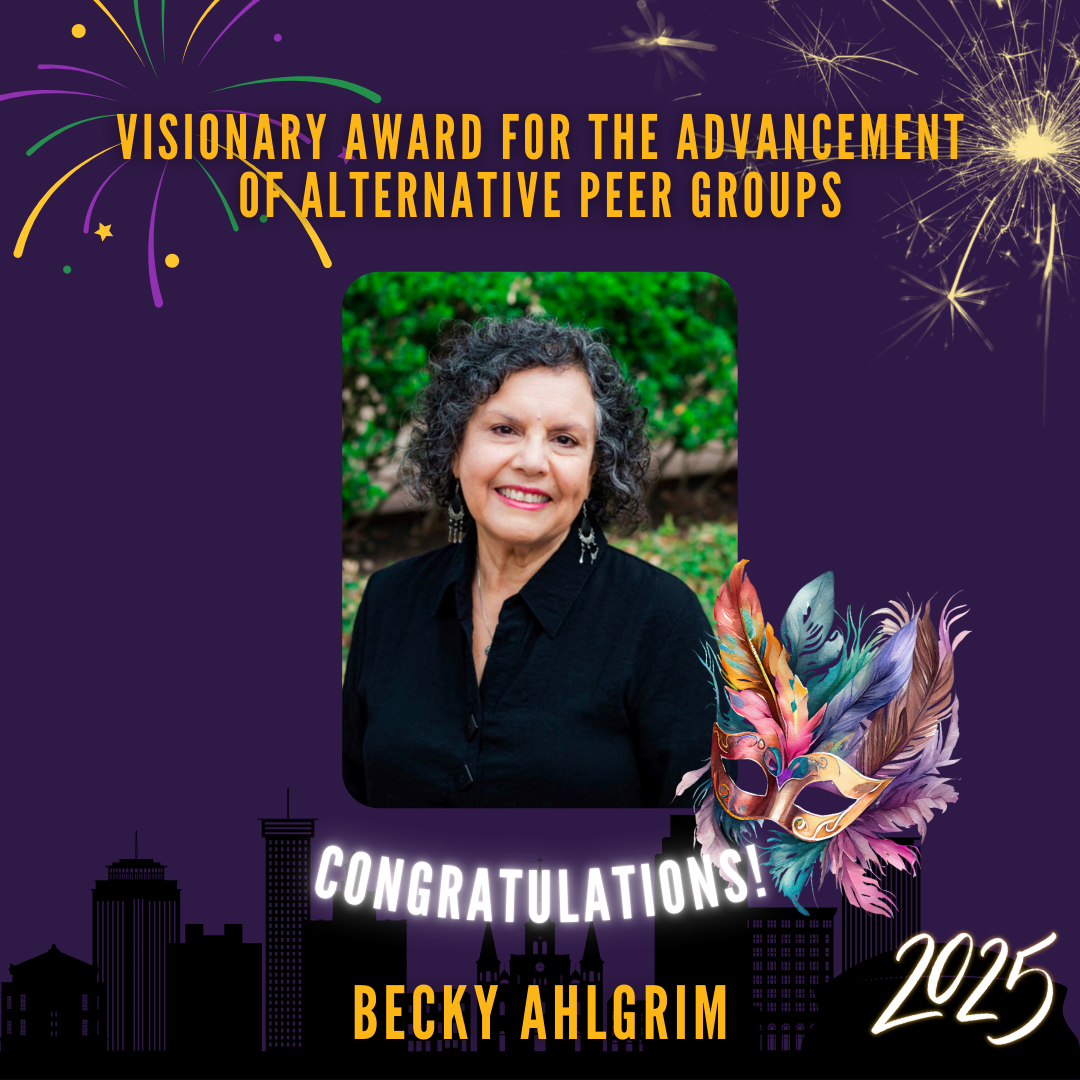
Becky Ahlgrim
Congratulations to all of the 2025 award winners!

